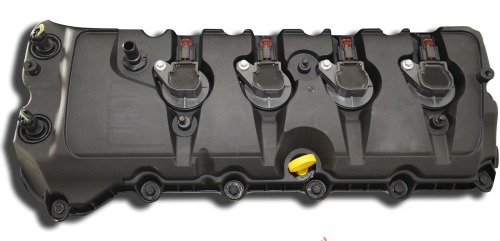I was going to write today about Facebook’s efforts to boost the energy efficiency of its Oregon data center by 38 percent. The social networking Goliath did that by redesigning servers and the operations of the facility, then broke with industry convention by sharing its secret sauce with competitors in a new initiative it calls the Open Compute Project.
(That didn’t exactly neutralize criticism from Greenpeace, which has mounted a campaign against Facebook for its dependence on coal-fired power plants at the company’s Prineville, Ore., data center.)
Data centers are the steel mills of our post-industrial information economy and consume enormous amounts of electricity, so reducing their power consumption is a huge environmental issue.
Unfortunately, it’s also quite a boring topic to non-engineers. (Believe me, I watched the live Facebook webcast on the Open Compute Project on Thursday.)
 Why use virgin plastic for cylinder covers when recycled carpet does the trick?Photo: FordSo, since it’s Friday, I was easily distracted by this news morsel: Ford is using recycled carpet in its engines. More specifically, the recycled material is being repurposed as cylinder head covers.
Why use virgin plastic for cylinder covers when recycled carpet does the trick?Photo: FordSo, since it’s Friday, I was easily distracted by this news morsel: Ford is using recycled carpet in its engines. More specifically, the recycled material is being repurposed as cylinder head covers.
Now normally, I would have no idea what that means exactly, but I recently wrote a story on Silicon Valley-backed startups developing new super fuel-efficient versions of the internal combustion engine, so I’ve spent some time in garages lately.
The cylinder head is the part of the engine where fuel combustion takes place. Cylinder head covers usually are made of virgin plastic — read petroleum. (Ford has also used soy for seat cushions, recycled yarn for seat covers, and old blue jeans to dampen sound.)
Ford is now using a material called EcoLon, made by Wellman Engineering Resins from entirely recycled carpet, for cylinder heads manufactured by Dana Holding Corporation in its Escape, Fusion, Mustang, and F-150 vehicles.
The bottom line: Ford says it has so far kept 4.1 million pounds of carpets out of landfills — that’s the equivalent of 154 football fields, according to the automaker — and has reduced oil consumption by 430,000 gallons.
Sounds like a magic carpet ride.




